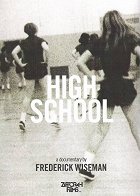Opisy(1)
When making documentaries, Frederick Wiseman has always preferred to stay in one place for an extended period of time, so that he can really sink his teeth into his subject matter: a hospital, an asylum for the criminally insane, the welfare office. In 1968, he set his sights on a high school in Philadelphia and observed the daily activities of teachers, students, and others. His investigative camera infiltrates the biology, gym, and typing classes -- yes, on old-fashioned typewriters! -- and records orientation meetings and parents' evenings. Just as always, Wiseman achieves this in a casual, non-narrative style. In High School, he reveals himself to be interested primarily in the ideological and political values that the school conveys to its students. The pessimistic picture that High School paints of life at a large metropolitan school ("You don't talk, you just listen to me!") is strongly influenced by the times in which the film was made. In the late 1960s, the height of the American protest movement, many social critics saw schools as the cornerstones of an unjust establishment. Nonetheless, some of the problems Wiseman captures are still relevant today. The recent debate about whether Muslim girls should be allowed to wear headscarves in class shows that students still are not free to dress any way they choose. (International Documentary Film Festival Amsterdam)
(więcej)Recenzje (2)
One year after the creation of this film, the famous philosopher and Marxist Louis Althusser published his most well-known essay, "Ideology and Ideological State Apparatuses," in France - and it does not take a genius to guess that the main ideological apparatus of modern times appeared to him to be none other than the school. A space of constantly circulating and seemingly imperceptible relationships of discipline, dominance, internalization of external norms, the fabrication of standardized "individuals" in the likeness of writing courses on typewriters - that is, individuals with only one form of communication; in the likeness of fashion courses for girls - that is, with only one form of self-presentation; in the likeness of lectures on sex education - that is, with only one form of intimacy. It is also necessary to remind some of the politically naïve people among us who imagine ideology as a centralized process of deformation led by evil priests (18th century) or totalitarian Nazi-Communists (20th century), that ideology is common to all social formations and serves as a kind of coordinate system in the likeness of cultural patterns - it also serves as orientation in the world and the self-regulation of society, and thus it is spread throughout the fabric of society and necessarily acquired by those who propagate it. Wiseman perfectly shows us this in the final scene with the teacher, who is moved by a letter from a former student who voluntarily went to Vietnam to fight for the safety of a free world. In Wiseman's film, the school is depicted as a self-affirming ideological mechanism of Western (capitalist) society in the late 1960s.
()
In this document, it is beautiful that it does not need any comment. Only the protagonists are left to speak. Wiseman captures basically ordinary school days, but thanks to how he edited individual scenes together and thanks to how the teachers are convinced that what they are doing is absolutely right, the film sounds extremely dark and shows that the children - at least at the given school - are not taught by educators, but by foolish fanatics.
()
